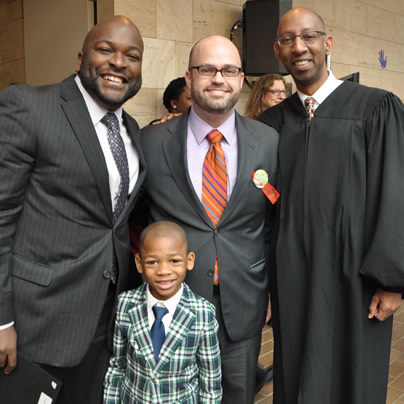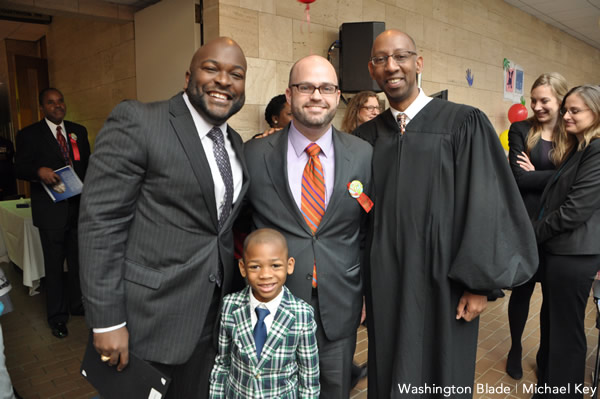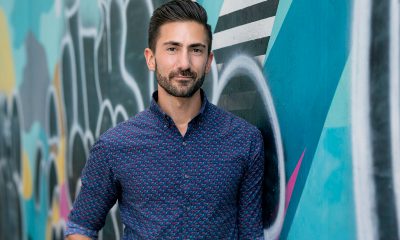Local
A home for Norman
D.C. couple finalizes family in ‘Adoption Day’ program


Chad Copeland, Scooter Ward and their son, Norman Moore with Judge Noel Johnson at an adoption day proceeding last weekend in D.C. Superior Court. (Washington Blade photo by Michael Key)
Norman Moore loves “Dora the Explorer,” playing Legos and macaroni and cheese.
“Give him those, and he’d be just fine,” his dad, Chad Copeland, says.
His other dad, Scooter Ward, calls Norman, 5, “quite an actor” and “a big ham.”
He also, “likes to be a teacher,” Ward says. “Loves to show you how to do something.”
The three of them, together since Norman was placed with them as a foster son in January 2011, became a permanent family unit last weekend when Judge Lee Satterfield of D.C. Superior Court signed their adoption decree. Of the 34 children adopted last weekend in D.C., five were to gay male couples.
“It’s ceremonial but also a legal proceeding,” Copeland, 36, a D.C. assistant attorney general, says. “Each family and child is called up and you go up with any close friends or family you have with you and a small speech is made.”
Ward says it was an emotional end to a very long process.
“I was kind of thinking beforehand, ‘Oh, it’s no big deal, he’s been with us almost two years, blah blah blah, but then about an hour into it, I started to get pretty emotional,” he says. “I started to really think about how long the journey has been and even though it’s been relatively smooth in a lot of ways, it’s also been very hard in some ways as well. There were many points along the way where things came up that could have changed the outcome, so knowing we’ve overcome all that was really amazing.”
For his part, Norman, who calls Copeland “Dad” and Ward “Pops,” says he was “happy when the lady called my name.” He also says he “got lots of goodies.”
Copeland and Ward have a D.C. domestic partnership. They met at a Human Rights Campaign fundraiser in Dallas, where they formerly lived (though neither are from Texas). They’ve been together almost seven years and have lived together about five years. After starting their relationship in Texas, Ward moved to Washington for a job in 2006. Copeland followed in 2007. Copeland is adopted himself, so they talked fairly early in their relationship about the possibility of adopting.
Working with D.C.’s Child and Family Services Agency, the couple took a licensing course and within about four months, Norman came to live with them. He had been born in D.C. but the couple declines to go into details about his biological family or situation.
“He was just a pretty normal kid who was in a situation where he could not be cared for the way he needed to be,” Copeland says.
Although there were some long nights and an inevitable adjustment period for everyone, the couple says for the most part, it “just clicked.”
“We were extremely tired,” Ward says. “We’d both been kind of extreme night owls before and we’d suddenly have family and friends calling us at, like, 10 at night and we’d be ready for bed … but in many ways it was a very organic change.”
Ward, 35, took a few weeks off from his job as a project manager for a D.C.-based software company, but Norman had already been in preschool, so neither parent had to give up his career.
Both say their being gay was never an issue in the adoption.
Copeland says he knew from his legal work — he’d worked on cases involving anti-gay Maryland minister Rev. Harry Jackson who’d sued the District — that D.C.’s Human Rights Act of 1977 is solid.
“I fully understood the breadth of protection that exists within the law,” he says. “I didn’t anticipate a problem and we never once had a single problem.”
Ward says he was bracing himself just in case.
“As a bi-racial gay couple, I kind of expected there to be a different layer there or something, some level of strife, but we never had any problems at all. It was almost a bit of a let down — I wanted to be advocate for something, but that says a lot of great things about where we live that it wasn’t.”
There was a chance early on, that Norman may have returned to his biological family.
“That’s usually the initial goal in a foster care situation,” Copeland says. “It would have been very hard because he really is just the sweetest little boy and it was very easy to just get so attached to him. There were certainly moments where we may never have made it to adoption, but our social workers were always there to help us understand the next steps.”
The couple praises the D.C. staff they worked with throughout — social workers LaTasha McKinley and Sarah McDonald and also Mallory Martin of the Children’s Law Center who acted on Norman’s behalf.
It all sounds so perfect — surely there were some struggles for the new family, right?
The couple says the hardest part was the element of so much being unknown at the outset.
“We were just foster parents for a long time,” Ward says. “We had no idea what the next court hearing could bring. There was a lot of pandering and stress and emotion and I don’t want to discount that. There’s a lot of emotion tied to it.”
But it did all work out. The family is in Dallas this week for Thanksgiving with Ward’s family. Copeland is in his native Louisiana and both say their respective parents were quick to welcome Norman as a grandchild.
“He does everything here he’s not allowed to do at home, which is just how it should be at your grandparents’ house,” Ward says with a chuckle.
On Tuesday this week, Norman spent the day hanging out with “Nana,” Ward’s mother. This wasn’t his first plane ride, Copeland has to remind him. His favorite time in Texas so far has been playing with his cousin, Erica. They’ll have Thanksgiving dinner Thursday at Uncle Tim’s.
Since same-sex marriage is legal in Washington, the couple may eventually wed. They have no immediate plans to, though, and say that wasn’t an issue in the process nor would it have been had they been a straight couple.
Norman is in kindergarten and attends a charter school in D.C.
The couple says he’s doing great overall and they’re often amused by, as Ward puts it, his “amazing level of innocence.”
“He’s very happy to have a home,” Copeland says. “He loves us and is a very sweet and happy boy. Happy is the right word in some ways, but it’s also an insufficient word because there are so many more emotions attached to it. You realize you’ve contributed to something bigger. This little boy had so many obstacles in his path. It’s all just sort of humbling and overwhelming at the same time.”
District of Columbia
Gay ANC member announces candidacy for Ward 1 D.C. Council seat
Community leader Brian Footer seeking seat held by Brianne Nadeau

Gay Advisory Neighborhood Commissioner Brian Footer, a community activist who has been involved for many years in local and national government affairs, has announced his candidacy for the Ward 1 D.C. Council seat up for election in 2026.
Footer, a Democrat, will be running in the city’s June 2, 2026, Democratic primary for the Ward 1 Council seat, but it is uncertain whether he will be running against incumbent Ward 1 Council member Brianne Nadeau (D). Nadeau has not yet announced if she plans to run for re-election for a fourth term following her 12 years on the Council.
Nadeau has been a longtime vocal supporter of the LGBTQ community.
If Footer were to win the primary and the November 2026 general election, he would become the Council’s second openly gay member. Ward 5 Council member Zachary Parker (D) is currently the 13-member Council’s only gay member.
Footer is a three-term ANC commissioner who currently serves as Chair of ANC 1E, which represents the city’s Adams Morgan neighborhood.
“Brian has worked at every level of government — federal, state, and local — building a career rooted in public service, aging policy, and inclusive urban planning,” a statement on his campaign website says.
“I’m running for Council because too many people in Ward 1 are doing everything right and still feel ignored by the city they call home,” Footer states on his website.
“I’m running because we can do better,” his statement continues. “That means making housing more affordable, addressing homelessness with real solutions, and keeping our neighborhoods safe with smart, community focused strategies.”
When contacted by the Washington Blade for comment, Nadeau said she was not ready at this time to discuss her plans about running again or about Footer’s candidacy.
“The primary is a ways away, and I’m very focused right now on the budget and the stadium deal and all the work that we’re doing at the Council,” she told the Blade. “So, I really haven’t had time to turn to my plans. So, as a result, I’m also not going to be commenting on anybody else who is determined that they’re running at this time.”
She first won election to the Council in 2014 after she defeated four-term gay Ward 1 Council member Jim Graham in the Democratic primary after Graham became embroiled in an ethics controversy.
In the 2022 Democratic primary Nadeau defeated gay challenger Salah Czapary in a three-candidate race, by a margin of 48.5% of the vote compared to Czapary’s 30.9%.
With the third candidate, Sabel Harris, receiving 20.4%, the outcome showed that the two challengers had a combined total vote count higher than Nadeau.
Further details of Footer’s candidacy can be accessed from his campaign website, brianfooterdc.com.
District of Columbia
Gay GOP group hosts Ernst, 3 House members — all of whom oppose Equality Act
Log Cabin, congressional guest speakers mum on June 25 event

U.S. Sen. Joni Ernst (R-Iowa) and three women Republican members of the U.S. House appeared as guest speakers at the June 25 meeting of Log Cabin Republicans of D.C., the local chapter of the national LGBTQ Republican group with that same name.
The U.S. House members who joined Ernst as guest speakers at the Log Cabin meeting were Celeste Maloy (R-Utah), Kat Cammack (R-Fla.), and Julia Letlow (R-La.).
Neither D.C. Log Cabin Republicans President Andrew Minik nor spokespersons for Ernst or the three congresswomen immediately responded to a request by the Washington Blade for comment on the GOP lawmakers’ appearance at an LGBTQ GOP group’s meeting.
“Please join us for an inspiring evening as we celebrate and recognize the bold leadership and accomplishments of Republican women in Congress,” a D.C Log Cabin announcement sent to its members states.
“This month’s meeting will highlight the efforts of the Republican Women’s Caucus and explore key issues such as the Protection of Women and Girls In Sports Act and the broader fight to preserve women’s spaces in society,” the message says.
It was referring to legislation pending in Congress calling for banning transgender women from participating in women’s sports events.
According to media reports, Ernst and the three congresswomen have expressed opposition to the Equality Act, the longstanding bill pending in Congress calling for prohibiting discrimination based on sexual orientation and gender identity in the areas of employment, housing, and public accommodations.
The Log Cabin announcement says the meeting was scheduled to take place at the Royal Sands Social Club, which is a restaurant and bar at 26 N St., S.E. in the city’s Navy Yard area.
D.C. Log Cabin member Stuart West, who attended the meeting, confirmed that Ernst and the three congresswomen showed up and spoke at the event.
“It was a good turnout,” he said. “I would definitely say probably 30 or 40 people attended.” West added, “Four women came to talk to a group of mostly gay men. That’s something you don’t see very often.”
District of Columbia
D.C. police seek public’s help in July 5 murder of trans woman
Relative disputes initial decision not to list case as hate crime

D.C. police are seeking help from the public in their investigation into the murder of a transgender woman who they say was shot to death at about 12:30 a.m. on Saturday, July 5, on the 2000 block of Benning Road, N.E.
But the police announcement of the fatal shooting and a police report obtained by the Washington Blade do not identify the victim, 28-year-old Daquane ‘Dream’ Johnson of Northeast D.C., as transgender. And the police report says the shooting is not currently listed as a suspected hate crime.
It was local transgender activists and one of Johnson’s family members, her aunt, who confirmed she was transgender and said information they obtained indicates the killing could have been a hate crime.
“On Saturday, July 5, at approximately 12:51 a.m., Sixth District officers were flagged down in the 2000 block of Benning Road, Northeast, for an unconscious female,” a July 5 D.C. police statement says. “Upon arrival, officers located an adult female victim suffering from gunshot wounds,” it says.
“D.C. Fire and EMS responded to the scene and transported the victim to a local hospital where after all lifesaving efforts failed and the victim was pronounced dead,” the statement says.
A separate police flyer with a photo of Johnson announces an award of $25,000 was being offered for information leading to the arrest and conviction of the person or persons responsible for the murder.
The flyer identifies D.C. police Homicide Detective Natasha Kennedy as being the lead investigator in the case and says anyone with information about the case should contact her at 202-380-6198.
Longtime D.C. transgender rights advocate Earline Budd told the Blade that one of the police investigators contacted her about the case and that she also spoke to Detective Kennedy. Budd said police confirmed to her that Johnson was a transgender woman.

One of Johnson’s family members, Vanna Terrell, who identified herself as Johnson’s aunt, told the Blade that Johnson used the first name of Dream and had planned to legally adopt that name instead of Daquane but had not gotten around to doing so.
Terrell said she and other family members learned more about the incident when one of two teenage high school students who knew Johnson’s brother contacted a friend and told the friend that they recognized Johnson as they witnessed the shooting. Terrell said the friend then called her to tell her what the friend learned from the two witnesses.
According to Terrell, the witnesses reportedly saw three men approach Johnson as Johnson walked along Benning Road and one of them called Johnson a derogatory name, leading Terrell to believe the men recognized Johnson as a transgender woman.
Terrell said one of the witnesses told the friend, who spoke to Terrell, that the man who shot Johnson kept shooting her until all of the bullets were fired. Budd, who said she spoke to Terrell, who also told her what the witnesses reported, said she believed the multiple shots fired by the shooter was an “overkill” that appears to have been a hate crime. Terrell said she too believes the murder was a hate crime.
In response to an inquiry from the Blade, Officer Ebony Major, a D.C. police spokesperson, stated in an email, “At this point there is nothing in the investigation that indicates the offense was motivated by hate or bias.”
Terrell said a memorial gathering to honor Johnson’s life was scheduled to be held Saturday, July 12, at River Terrace Park, which is located at 500 36th St., N.E. not far from where the shooting occurred.

-

 Federal Government2 days ago
Federal Government2 days agoTreasury Department has a gay secretary but LGBTQ staff are under siege
-

 Virginia3 days ago
Virginia3 days agoDefying trends, new LGBTQ center opens in rural Winchester, Va.
-

 District of Columbia2 days ago
District of Columbia2 days agoGay GOP group hosts Ernst, 3 House members — all of whom oppose Equality Act
-

 Opinions4 days ago
Opinions4 days agoUSAID’s demise: America’s global betrayal of trust with LGBTQ people









